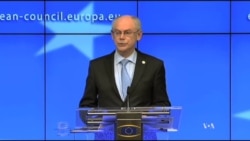LONDON —
The European Union is suspending visa talks with Moscow in response to Russia’s incursion into the Ukrainian region of Crimea. The EU is also calling a vote in Crimea’s parliament to break away from Ukraine and join Russia ‘illegal’.
The European Union describes the crisis in Ukraine as the continent’s most serious challenge to security since the Balkan Wars of the 1990's.
After the heads of state meeting Thursday - also attended by Ukraine’s prime minister - EU Council President Herman Van Rompuy delivered the bloc’s response.
“To suspend bilateral talks with the Russian Federation on visa matters as well as talks with the Russian Federation on the New Agreement. We support the decision of the European Members of the G-8 and the EU institutions to suspend their participation in G-8 Summit preparations until further notice,” he said.
Van Rompuy demanded that Russia enter negotiations with Ukraine and respect Ukraine's sovereignty in Crimea - or face travel bans and asset freezes. Russia denies the armed groups that have taken over much of Crimea are members of its armed forces.
“The majority of the people of Ukraine made a decisive choice in favor of our European values. It was a civilization choice. Europe must and will support them on the courageous road they have chosen,” he said.
Europe has held off imposing economic sanctions for now.
President Putin is calculating that Europe is divided on the issue, says Elizabeth Stephens, head of risk analysis at insurance brokers Jardine Lloyd Thompson.
“The Germans have the strongest trading ties. Angela Merkel is very reluctant to impose sanctions. British Prime Minister David Cameron is concerned the city of London would be hit if sanctions were imposed on some of Russia’s oligarchs. I think the biggest challenge is actually the EU speaking with one voice,” she said.
London is a favored destination for Russia’s super-rich, with an estimated 32,000 Russian nationals living in the capital.
Germany’s two-way trade with Russia topped $104 billion in 2013. Economic giants like Volkswagen have invested heavily in Russia.
But German Chancellor Angela Merkel reiterated warnings that Moscow would face ‘costs’. She said that Germany wants to continue its relations with Russia, which obviously are of mutual interest. But she said what has happened in Ukraine, and particularly what has happened on the Crimean peninsula, deserves a response.
If the crisis escalates, European sanctions could bite hard, says Elizabeth Stephens.
“The wealth in Russia is owned by 110 billionaires who own about 35 percent of the country’s economic resources. They would be the key people to target, and they are the people who have influence over Putin,” said Stephens.
For now, the EU is still threatening, rather than implementing sanctions. Europe, and the world, await President Putin’s response.
The European Union describes the crisis in Ukraine as the continent’s most serious challenge to security since the Balkan Wars of the 1990's.
After the heads of state meeting Thursday - also attended by Ukraine’s prime minister - EU Council President Herman Van Rompuy delivered the bloc’s response.
“To suspend bilateral talks with the Russian Federation on visa matters as well as talks with the Russian Federation on the New Agreement. We support the decision of the European Members of the G-8 and the EU institutions to suspend their participation in G-8 Summit preparations until further notice,” he said.
Van Rompuy demanded that Russia enter negotiations with Ukraine and respect Ukraine's sovereignty in Crimea - or face travel bans and asset freezes. Russia denies the armed groups that have taken over much of Crimea are members of its armed forces.
“The majority of the people of Ukraine made a decisive choice in favor of our European values. It was a civilization choice. Europe must and will support them on the courageous road they have chosen,” he said.
Europe has held off imposing economic sanctions for now.
President Putin is calculating that Europe is divided on the issue, says Elizabeth Stephens, head of risk analysis at insurance brokers Jardine Lloyd Thompson.
“The Germans have the strongest trading ties. Angela Merkel is very reluctant to impose sanctions. British Prime Minister David Cameron is concerned the city of London would be hit if sanctions were imposed on some of Russia’s oligarchs. I think the biggest challenge is actually the EU speaking with one voice,” she said.
London is a favored destination for Russia’s super-rich, with an estimated 32,000 Russian nationals living in the capital.
Germany’s two-way trade with Russia topped $104 billion in 2013. Economic giants like Volkswagen have invested heavily in Russia.
But German Chancellor Angela Merkel reiterated warnings that Moscow would face ‘costs’. She said that Germany wants to continue its relations with Russia, which obviously are of mutual interest. But she said what has happened in Ukraine, and particularly what has happened on the Crimean peninsula, deserves a response.
If the crisis escalates, European sanctions could bite hard, says Elizabeth Stephens.
“The wealth in Russia is owned by 110 billionaires who own about 35 percent of the country’s economic resources. They would be the key people to target, and they are the people who have influence over Putin,” said Stephens.
For now, the EU is still threatening, rather than implementing sanctions. Europe, and the world, await President Putin’s response.





